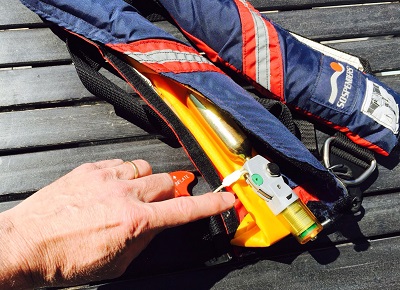 The autumn boating season has arrived, and with it comes cooler water temperatures. A fall overboard can get serious quickly, and wearing a life jacket could give you extra time to survive.
The autumn boating season has arrived, and with it comes cooler water temperatures. A fall overboard can get serious quickly, and wearing a life jacket could give you extra time to survive.
While many boaters have traditional floatation-filled life jackets, an increasing number have switched to more modern inflatable life jackets, which require a little preparation each year. If you haven’t inspected your inflatable life jacket and it’s gone through a summer’s worth of hard boating, now is a good time to take a close look at it.
Here’s a quick four-step prep for your inflatable life jacket from the BoatUS Foundation for Boating Safety and Clean Water:
- Open it up and look. Gently open the life jacket, usually by pulling apart any hook-and-loop tape covers or flaps and then unfolding. Pay close attention because repacking it is essentially the reverse of this process. Inside you will find a thin-walled bladder, which is what keeps your head above water when inflated, so take your time looking for any tears or abrasions. Are the waist strap and all buckles in working condition?
- Remove the cartridge. Unscrew the CO2 cartridge and ensure it hasn’t been discharged, sometimes indicated by a small puncture in the center of the threaded end. Some inflators will have a green ready-to-go indicator. Check the cartridge and inflation mechanism for corrosion. Some inflator mechanisms have a little “pill” or “bobbin” that dissolves in water allowing for automatic inflation. It should be in good shape. If not, purchase a rearming kit.
- Test for leaks. Using your mouth, blow up the life jacket using the manual-inflation tube found on the upper left front of the life jacket. This tube may also be used as a back up to fill the jacket with air in an emergency, so familiarize yourself with how it works. Leave the fully inflated life jacket alone for 24 hours to test for leaks.
- Repack. If, after the time is up and the life jacket still holds air, deflate it and repack according to the instructions, which usually can be found on an inside flap. Now you’re ready for fall boating season!
